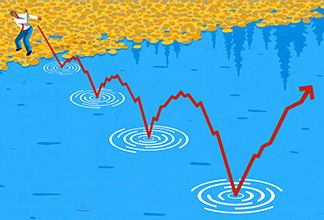4 Key Issues Affecting Global Growth
Written by The Content Team | Published on July 10, 2018
Written by The Content Team | Published on July 10, 2018
"The first half of 2018 has provided quite a contrast to the sunny trends that smiled on 2017. Last year's silky-smooth markets have hit turbulence. Economic growth has dipped and the euphoria following tax cuts is now mixed in equal parts with concern about protectionism."
So begins the "Macro and Markets" section of The Global Investment Outlook, the latest quarterly report from the RBC Global Asset Management (GAM) Strategy Committee. As markets face these potential stumbling blocks, let's look at four key macro risks affecting the global economy.
According to RBC GAM Chief Economist Eric Lascelles, trade protectionism is "among the key risks" the team is keeping an eye on. However, Lascelles says he stops "short of calling it a big problem at this juncture simply because it's surprising how much protectionism you actually need before you start to do serious economic damage." The level of protectionism we've seen from the U.S. and other countries in recent months may slow growth a little and push inflation up, but it is still far from trade-war status.
Economists look to the business cycle as part of measuring the risk of recession. The business cycle is the natural rise and fall of the economy over time — not markets, but the economy — as measured by gross domestic product. The GAM Strategy Committee believes the U.S. is currently at a later stage in the cycle, based on economic indicators. When economic signals are good, interest rates are rising and optimism is strong, it is often a sign that the business cycle is heading toward contraction. According to Lascelles, this shift is currently in view, but not around the corner. "It is crystal clear that we are not presently in a recession, and nor does anything suggest that one is imminent. However, a number of recession gauges are rising."
Central banks around the world are moving away from monetary stimulus and this means interest rates are starting to rise, which can cause a drag on economic growth. In Canada, high household debt levels mean that higher interest rates can have more of an effect, particularly in uncertain housing markets, as mortgage rates rise. "We think there's a fair chance the housing market goes in a more sideways direction in Canada in the future as opposed to the up and up that's been the dominant theme for the last decade," says Lascelles. The Committee believes the tightening from central banks is appropriate at this point in the global economy.
Despite recent slowing of the European economy, the region is still growing. In fact, according to Lascelles, Europe is growing well by post-crisis standards. "We think there's a bit of a runway left for that region simply because it hasn't eaten through all of its economic slack just yet," he says. In the U.K., Brexit has held back growth and, according to Lascelles, will likely continue to do so. "It's not a great situation, but they're still growing and their economy is fairly tight for the time being."
Europe might be chugging along well economically, but political upheaval continues. Italy electing a populist government is the latest in a string of changes that could inhibit growth. Despite the ever-changing political situation, Lascelles says, "I would still say the risk of a full Eurozone breakup is quite low."
Growth slowed in the first half of 2018, but economies around the globe are still expanding and the rate of global growth remains positive overall. The RBC GAM Strategy Committee believes that the global economy will "successfully navigate" the challenges above (among others) and "continue to expand."
RBC Direct Investing Inc. and Royal Bank of Canada are separate corporate entities which are affiliated. RBC Direct Investing Inc. is a wholly owned subsidiary of Royal Bank of Canada and is a Member of the Investment Industry Regulatory Organization of Canada and the Canadian Investor Protection Fund. Royal Bank of Canada and certain of its issuers are related to RBC Direct Investing Inc. RBC Direct Investing Inc. does not provide investment advice or recommendations regarding the purchase or sale of any securities. Investors are responsible for their own investment decisions. RBC Direct Investing is a business name used by RBC Direct Investing Inc. ® / ™ Trademark(s) of Royal Bank of Canada. RBC and Royal Bank are registered trademarks of Royal Bank of Canada. Used under licence. © Royal Bank of Canada 2018. All rights reserved.
The views and opinions expressed in this publication are for your general interest and do not necessarily reflect the views and opinions of RBC Direct Investing. Furthermore, the products, services and securities referred to in this publication are only available in Canada and other jurisdictions where they may be legally offered for sale. If you are not currently resident of Canada, you should not access the information available on the RBC Direct Investing website.

Investors can now focus on what a second Donald Trump presidency might look like

Dates, deadlines, announcements and more that self-directed investors need to know.